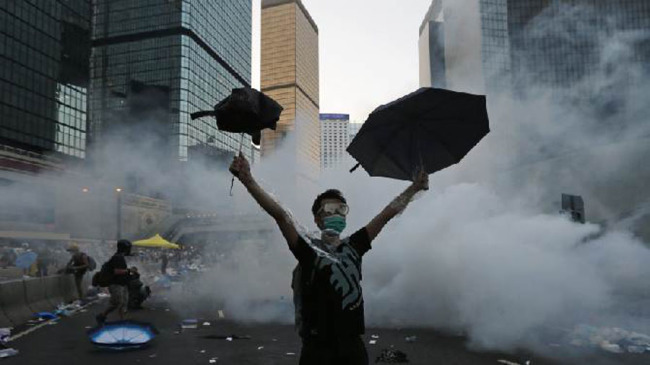
I woke up to see my Facebook newsfeed flooded with news about the Hong Kong riot.
Videos, pictures and status updates by my old classmates and friends showed them protesting for pro-democracy in the city.
Photos of students popped up on my feed wearing surgical masks and video footage showed of herds of people screaming in Chinese and English.
Young students and activists have joined forces with Occupy Central, a civil disobedience movement demanding more democracy regarding Beijing’s decision to rid of free elections in Hong Kong.
In recent months, Beijing has asserted more control over Hong Kong.
Beijing has promised a free election to choose the next leader by 2017, but Occupy Central and other pro-democracy supporters do not agree with the guidelines.
Fifty thousand demonstrators gathered in the city’s financial district of Admiralty Saturday night in Hong Kong.
The group of students and activists were peacefully protesting until police gave a short warning saying to “leave peacefully and in an orderly manner, otherwise officers would use a higher level of force.”
Protestors remained on the streets protesting until late in the night. Riot police then used force.
Tear gas and pepper spray were released, scattering protestors. Police also started arresting citizens, totaling to 78 by the end of the night.
Fifty thousand young activists were wrongfully attacked by police.
Living in a country where it is a right to exercise freedom of speech and freedom to peacefully protest, it is mind-boggling to me that citizens of Hong Kong cannot.
This failed protest is just one example of many that are forcefully stopped by Asian governments.
Last December, the Singapore government broke apart migrant workers protesting in Little India, arresting and deporting selected individuals.
This past week Chinese government bombed rioters in Xinjiang, killing 50.
The suppression of freedom of speech is astounding. Lack of democracy in certain Asiatic countries, especially lack of free speech is what leads to the protests, that then lead to violent attacks by police on civilians.
Civil disobedience should not allow justification for punishment. Civil disobedience, if done within peaceful means by both parties, can allow for compromise or at least a chance to understand an appeal to reform current laws.
Without allowing citizens to speak their minds and voice their opinions, tension builds. People begin to hate the government instead of willfully following it. A lack of empathy from the government leads to resentment by the people. And that’s what I feel is happening in Hong Kong.
A riot like this has never happened to this extent. The last time Hong Kong police used tear gas was to break apart a protest about the World Trade Organization protest in 2005.
This protest was still different. Instead of breaking apart once tear gas was released, activists continued to protest.
They wore surgical masks, goggles and any other means to protect their face and sat out for hours onward until police forcibly removed participants.
These protesters are fighting for their right for freedom. They are fighting for their right to elect a leader that can truly lead Hong Kong.
They are the next generation, and they should be heard, not silenced.








